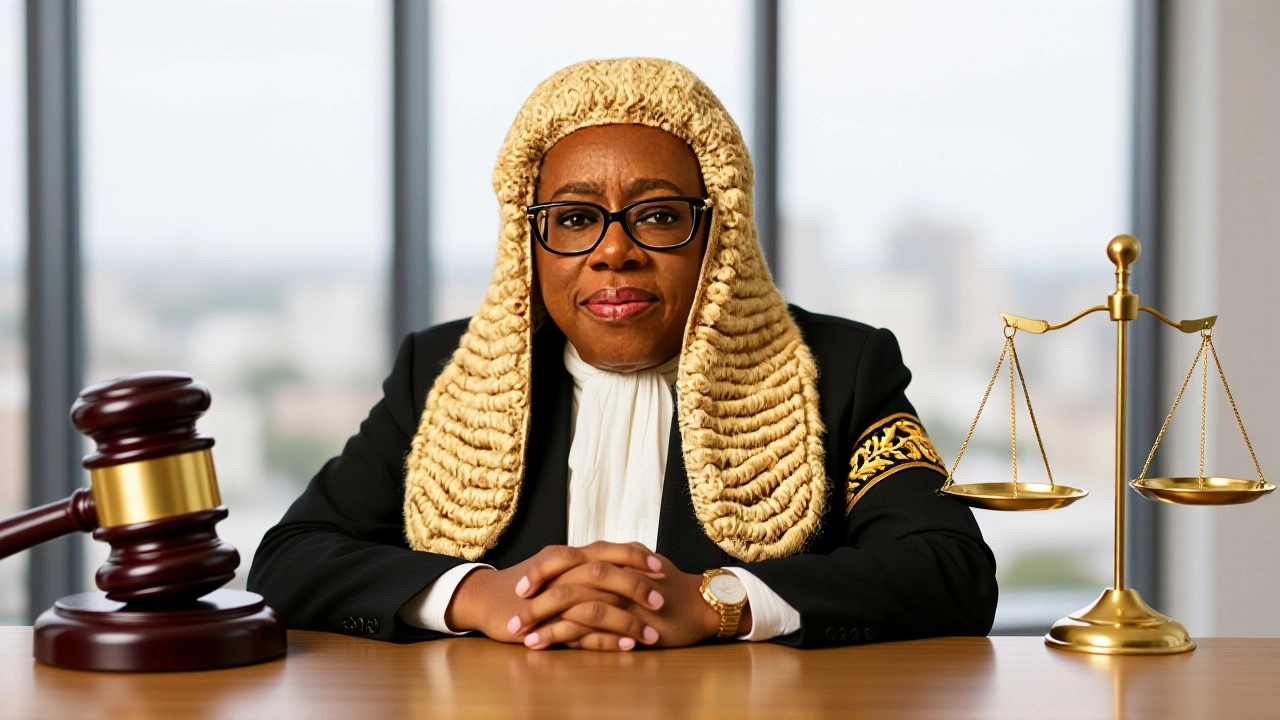On Monday, September 29, 2025, at 10:00 a.m. West Africa Time, Justice Kudirat Kekere-Ekun, the Chief Justice of Nigeria, will preside over one of the most significant ceremonies in the nation’s legal calendar: the swearing-in of 57 newly appointed Senior Advocates of Nigeria at the Supreme Court of Nigeria’s Main Courtroom in Abuja. This event formally kicks off the 2025/2026 legal year — a tradition dating back decades — and arrives amid mounting public pressure to restore faith in a justice system still grappling with delays, backlog, and perceptions of elitism.
A Historic Batch of ‘Silks’
The list of 57 appointees, released by the Legal Practitioners' Privileges Committee on July 24, 2025, includes 56 practicing lawyers and one academic — the largest single cohort since 2021. Three petitions challenging the eligibility of certain candidates were dismissed as baseless, according to Kabir Eniola, Secretary of the LPPC and Chief Registrar of the Supreme Court. Among the most notable names is Preye Agedah, former Solicitor-General and Permanent Secretary of the Bayelsa State Ministry of Justice, who also becomes the first person from Bayelsa State to be named a Life Bencher — a rare honor reserved for those who’ve shaped legal education and ethics. Equally significant is Chima Josephat Ubanyionwu, a legal scholar and ex-chairman of the Nigerian Bar Association’s Aguata Branch, selected under the academic category — a reminder that intellectual contribution matters as much as courtroom prowess.
The Weight of the Silk Robe
Being named a Senior Advocate of Nigeria isn’t just a title — it’s a transformation. Recipients earn the right to wear silk robes in court, a visual symbol that sets them apart from other lawyers. They’re granted front-row seating, priority in case listings, and, by custom, the expectation to mentor younger practitioners. But as Justice Kudirat Kekere-Ekun made clear during the mandatory induction program, this is no mere decoration. ‘You have now become the focus of the profession,’ she said through her representative. ‘It is not merely an honor. It is a solemn trust, a batch of responsibility and a call to leadership.’
The Body of Senior Advocates of Nigeria echoed this sentiment, warning that privilege without accountability erodes public trust. In a legal system where cases often languish for years, the new SANs are being watched closely. Will they use their influence to push for faster hearings? To challenge procedural abuses? To mentor pro bono lawyers in underserved states? The answer will determine whether this group becomes a force for reform — or just another elite club.
The State of the Judiciary
The swearing-in ceremony doubles as the annual State of the Judiciary address. Justice Kekere-Ekun will deliver a candid review of the 2024/2025 legal year, which ended on July 21, 2025, after what court officials called a ‘remarkably successful’ session. That success, however, masks persistent problems: over 4.2 million pending cases nationwide, according to the National Judicial Council’s 2024 report. In the Supreme Court alone, some appeals have waited over five years for hearing.
Key voices will weigh in during the ceremony — the Attorney General of the Federation and Minister of Justice, the President of the Nigerian Bar Association, and the Chairman of the Body of SANs. Their speeches are expected to address three urgent issues: the need for digital case management systems, the reform of judicial appointments, and the role of SANs in combating corruption within the courts. One senior lawyer in Lagos told us, ‘If these new silks don’t speak up about delays, who will? They’re the ones who can get cases heard tomorrow — not in five years.’

More Than Ceremony: A Moment of Accountability
This year’s batch arrives at a critical juncture. Public confidence in the judiciary has been shaken by high-profile corruption cases, slow verdicts in electoral disputes, and the perception that SAN appointments sometimes favor political connections over merit. The LPPC’s rejection of three petitions may have cleared the slate, but questions linger. Why did only one academic make the cut? Why are so few women represented? Why do some states consistently produce more SANs than others?
News Central TV reported on September 22 that these issues dominated private discussions among legal practitioners in the weeks leading up to the ceremony. The fact that the event is being held in Abuja — the political capital — rather than Lagos or Port Harcourt, underscores its symbolic weight. This isn’t just about robes and titles. It’s about whether the legal profession can reclaim its moral authority.
What Comes Next?
The Supreme Court’s vacation period, which ran from late July through September, is over. Now, the real work begins. The 57 new SANs will be expected to lead by example — not just in courtroom decorum, but in advocating for systemic change. Will they lobby for mandatory e-filing? Push for stricter timelines on judgments? Fund legal aid clinics in rural areas? Their actions in the next 12 months will define whether this year’s class is remembered as ceremonial… or catalytic.
Frequently Asked Questions
What privileges do Senior Advocates of Nigeria (SANs) receive?
SANs enjoy exclusive courtroom privileges, including front-row seating, priority in case listings, and the right to wear silk robes — hence their nickname, ‘silks.’ They also have the authority to file motions directly before the Supreme Court without prior leave, and are often consulted on complex legal matters by both courts and government agencies. These privileges are meant to reflect their expertise, but they come with the expectation of higher ethical standards.
How are SANs selected in Nigeria?
Candidates are vetted by the Legal Practitioners’ Privileges Committee, which evaluates their legal practice, published works, reputation, and contributions to the profession. Applications require endorsements from five existing SANs and must include evidence of at least 15 years of practice. Academic candidates must have published widely and taught law at a recognized university. The committee dismisses petitions if they lack credible evidence, as happened with three applicants ahead of the 2025 list.
Why is the appointment of a Life Bencher significant?
A Life Bencher is a rare honor bestowed upon individuals who’ve made extraordinary contributions to legal education and professional ethics — often through teaching, mentoring, or reform advocacy. Preye Agedah is the first person from Bayelsa State to receive this distinction, signaling a rare recognition of legal talent from Nigeria’s Niger Delta region. Unlike SANs, Life Benchers are not required to be practicing lawyers; they’re chosen for their lasting impact on the legal system.
How does this year’s number of SANs compare to previous years?
With 57 appointees, this is the largest cohort since 2021, when 61 were sworn in. The average over the past five years has been around 42 per year. The 2025 increase reflects both a backlog of qualified applicants and a deliberate effort by the LPPC to diversify the pool — though critics note that gender and regional representation still lag, with only 11 women among the 57 new SANs.
What impact could the new SANs have on Nigeria’s court delays?
The 4.2 million pending cases nationwide are a crisis. New SANs, with their influence and access to top courts, are uniquely positioned to push for reforms — like enforcing strict timelines for judgments or advocating for digital case tracking. Some have already pledged to take on pro bono cases in under-resourced states. But without institutional backing, their individual efforts may not move the needle. Their real power lies in collective advocacy — and whether they choose to use it.
Is the SAN system in Nigeria still relevant today?
Yes — but its credibility depends on transparency. Established in 1975, the SAN title remains Nigeria’s highest legal honor and is widely respected internationally. However, perceptions of favoritism and political influence have damaged its image. The dismissal of three petitions this year and the inclusion of an academic candidate suggest the LPPC is trying to restore integrity. For the system to endure, the new SANs must prove they serve justice — not just their own prestige.






17 Comments
ajay vishwakarma
November 18, 2025 AT 16:27 PMThe appointment of 57 new SANs is a monumental step forward for Nigeria’s legal system. With 11 women in this cohort, progress is visible, even if slow. The inclusion of an academic like Chima Josephat Ubanyionwu signals a long-overdue shift toward valuing scholarship alongside litigation. This isn’t just about silk robes-it’s about rebuilding credibility from the inside out. The real test? Whether they use their privilege to demand faster hearings, not just enjoy front-row seats.
Shruthi S
November 20, 2025 AT 13:19 PMfinally some good news from the judiciary 😭
devika daftardar
November 21, 2025 AT 14:46 PMyou know what i think its not about how many get appointed its about what they do after the robes are on like honestly how many of these silks will actually fight for the guy in the village who cant afford a lawyer maybe its just me but i feel like the system still rewards the loud ones not the ones who actually fix things
deepika singh
November 22, 2025 AT 08:02 AMOMG this is actually giving me chills 🥹 like imagine being part of a group that could actually change how justice works instead of just playing by the rules. Preye Agedah as a Life Bencher? That’s next-level. And the academic pick? YES. We need more minds in the courtroom, not just mouthpieces. If these 57 actually rally behind e-filing and case timelines, Nigeria’s courts could go from ‘dying’ to ‘dynamite’.
amar nath
November 22, 2025 AT 12:09 PMwait so only one academic got in? and 11 women outta 57? bro this is still a boys club with fancy robes. they say it’s merit-based but come on-how many of these guys went to the same three law schools and know the same five judges? the system’s rigged, and the LPPC’s just polishing the surface. real reform means opening the door wider, not just handing out more silk.
Pragya Jain
November 23, 2025 AT 06:52 AMNigeria is finally showing the world what real justice looks like. No more excuses. These 57 aren’t just lawyers-they’re national heroes. The delays? The backlog? Let them come. The SANs will crush it. Who cares if a few petitions were dismissed? The system works. We don’t need foreign opinions. This is African excellence in action.
Neha Jayaraj Jayaraj
November 25, 2025 AT 02:36 AMokay but did you SEE the list?? like who even IS Preye Agedah?? and why is there only ONE academic?? and why is it in ABUJA?? and why no one asked about the 46 women who were rejected?? this is not progress this is a photo op 🤡
Disha Thakkar
November 26, 2025 AT 20:03 PMHow quaint. Another elite ceremony dressed as reform. The LPPC is a closed circle with a PR team. The fact that they even bother holding this in Abuja-instead of Lagos where real legal battles are fought-proves they’re performing for politicians, not the people. And let’s not pretend ‘Life Bencher’ means anything without structural change. This is aesthetics, not accountability.
Abhilash Tiwari
November 27, 2025 AT 10:42 AMman i just hope these new silks actually show up in court and not just in the press releases. the real magic would be if they started refusing to take cases that are obviously just delays. like if you’re a SAN and your client’s case has been sitting for 5 years? walk away. make a statement. that’s the kind of power this robe should carry.
Anmol Madan
November 27, 2025 AT 17:59 PMyo is anyone else just hyped for the silk robes?? like imagine walking into court and everyone just goes silent because you’re wearing that thing?? also who’s gonna be the first SAN to get a TikTok? #SilkAndSlay
raman yadav
November 28, 2025 AT 04:46 AMyou think this is about justice? no it’s about legacy. the same families have been handing these titles to each other since 1975. they call it merit but it’s nepotism with a Latin name. the academic? a token. the women? a number. the life bencher from Bayelsa? a distraction. the real story? the 4.2 million cases still rotting in courtrooms while these men pose for pictures. they didn’t fix the system-they just added more names to the top of the pyramid.
Ajay Kumar
November 30, 2025 AT 02:33 AMthey say the petitions were dismissed as baseless but what if they were right? what if the LPPC is just covering up the fact that most of these appointments were made under pressure from the AG’s office? think about it-why now? why 57? why after the last election? this isn’t merit-it’s a political payoff. and the silk robes? they’re just the camouflage. the real corruption isn’t in the courtroom-it’s in the committee room. you think they’d let a woman from the Niger Delta become Life Bencher unless someone ordered it? this is control, not justice.
Chandra Bhushan Maurya
November 30, 2025 AT 21:25 PMmy heart just swelled when i read about Preye Agedah. first from Bayelsa to be Life Bencher? that’s not just a win for him-that’s a win for every kid in the Delta who thought law was a game for Lagos boys. and that academic pick? that’s the spark. this isn’t just about robes-it’s about who gets to be heard. if even one of these 57 uses their voice to demand e-filing, they’ve already changed Nigeria.
Hemanth Kumar
December 2, 2025 AT 11:24 AMIt is imperative to underscore that the formalization of the Senior Advocate of Nigeria designation remains an institutionally significant mechanism for the codification of professional excellence within the Nigerian jurisprudential framework. The elevation of academic contributors to the ranks of SAN, while statistically marginal, represents a paradigmatic shift toward the integration of theoretical rigor into practical legal leadership. The retention of procedural integrity in the dismissal of petitions further affirms the legitimacy of the LPPC’s vetting protocols. Nevertheless, the structural impediments to judicial efficiency remain unaddressed by ceremonial acts alone.
kunal duggal
December 3, 2025 AT 01:09 AMThe inclusion of an academic candidate under the SAN framework is a strategic alignment with global best practices in legal professionalism. The LPPC’s expansion of the cohort size suggests a deliberate effort to mitigate systemic backlog through increased appellate capacity. However, the absence of a formal mentorship mandate for new SANs remains a critical governance gap. Without institutionalized pro bono obligations tied to the title, the symbolic weight of the silk robe risks becoming performative rather than transformative. The next step? Mandate quarterly public reporting on case advocacy efforts by all SANs.
Ankush Gawale
December 3, 2025 AT 18:23 PMi just hope everyone remembers that the robe doesn’t make the lawyer. the real test is whether they listen to the people who aren’t in the courtroom. the ones who’ve been waiting 5 years. the ones who don’t know how to file a motion. the ones who don’t have a lawyer. if these 57 can just remember that, then maybe this ceremony means something.
fatima almarri
December 3, 2025 AT 23:03 PMthe fact that they included an academic is huge honestly like we always think of SANs as courtroom warriors but law is also about ideas and teaching and shaping minds. and preye agedah as a life bencher? that’s not just an honor it’s a message. the system is trying to say: your impact matters even if you’re not arguing in front of the supreme court. but now the real question-is anyone going to actually fund legal aid in the villages? because without that, this is just a very fancy party with silk robes.